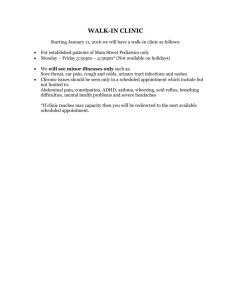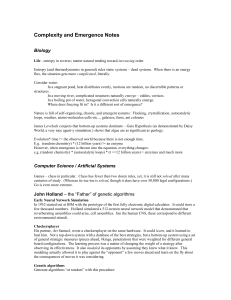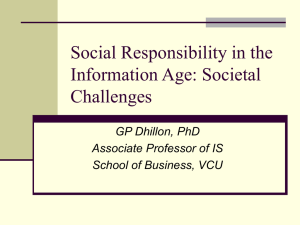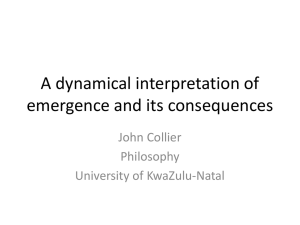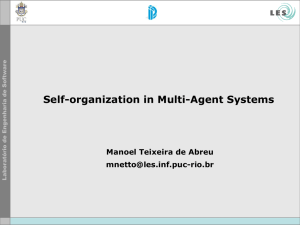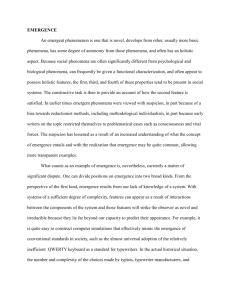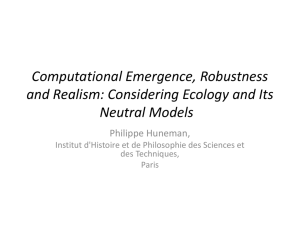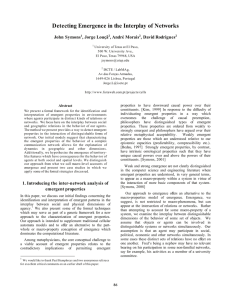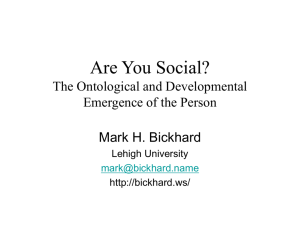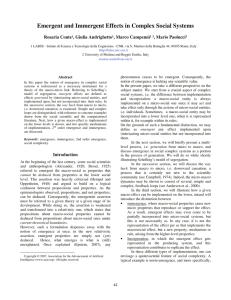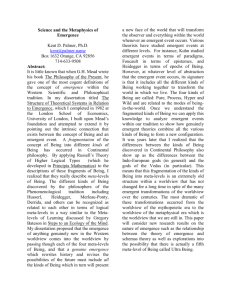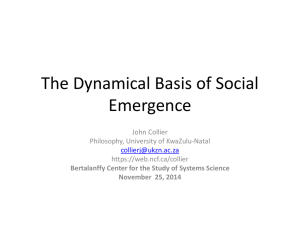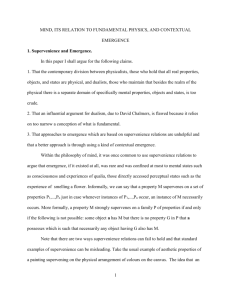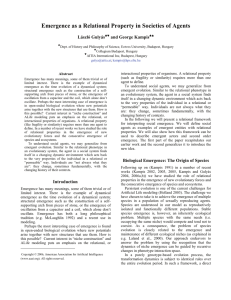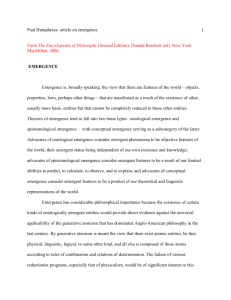Footprints of Emergence
advertisement
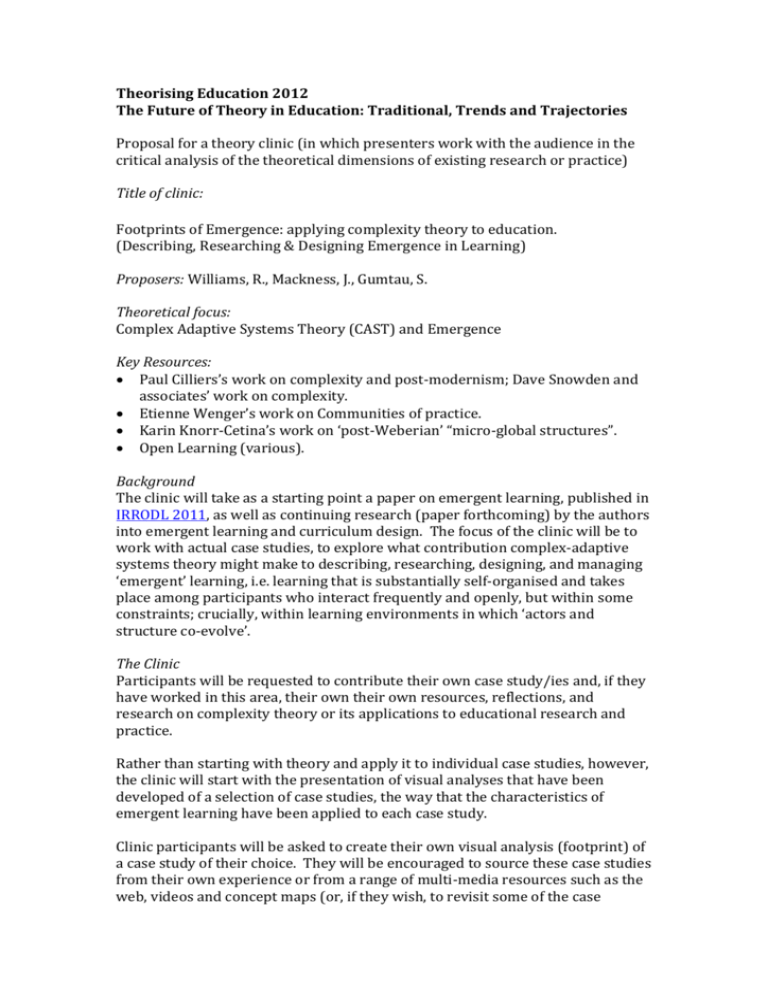
Theorising Education 2012 The Future of Theory in Education: Traditional, Trends and Trajectories Proposal for a theory clinic (in which presenters work with the audience in the critical analysis of the theoretical dimensions of existing research or practice) Title of clinic: Footprints of Emergence: applying complexity theory to education. (Describing, Researching & Designing Emergence in Learning) Proposers: Williams, R., Mackness, J., Gumtau, S. Theoretical focus: Complex Adaptive Systems Theory (CAST) and Emergence Key Resources: Paul Cilliers’s work on complexity and post-modernism; Dave Snowden and associates’ work on complexity. Etienne Wenger’s work on Communities of practice. Karin Knorr-Cetina’s work on ‘post-Weberian’ “micro-global structures”. Open Learning (various). Background The clinic will take as a starting point a paper on emergent learning, published in IRRODL 2011, as well as continuing research (paper forthcoming) by the authors into emergent learning and curriculum design. The focus of the clinic will be to work with actual case studies, to explore what contribution complex-adaptive systems theory might make to describing, researching, designing, and managing ‘emergent’ learning, i.e. learning that is substantially self-organised and takes place among participants who interact frequently and openly, but within some constraints; crucially, within learning environments in which ‘actors and structure co-evolve’. The Clinic Participants will be requested to contribute their own case study/ies and, if they have worked in this area, their own their own resources, reflections, and research on complexity theory or its applications to educational research and practice. Rather than starting with theory and apply it to individual case studies, however, the clinic will start with the presentation of visual analyses that have been developed of a selection of case studies, the way that the characteristics of emergent learning have been applied to each case study. Clinic participants will be asked to create their own visual analysis (footprint) of a case study of their choice. They will be encouraged to source these case studies from their own experience or from a range of multi-media resources such as the web, videos and concept maps (or, if they wish, to revisit some of the case studies already presented). These case studies will be graphically represented as a footprint (on in some other visual form), which applies existing learning theories, complex adaptive systems theory (CAST) and emergence. The premise of the clinic is that some institutions, and many teachers and learners are increasingly engaged in extensive networking, self-organised learning, and collaboration across the boundaries of ‘teachers’ and ‘learners’, and of ‘formal’ and ‘non-formal’ education and learning, and that this produces learning which does not necessarily follow predictable paths, or produce specific, predictable outcomes. And further, that many of the attempts to describe, research, design and manage this type of learning are already drawing on complexity theory in some way (e.g. Communities of Practice, Organisational and Knowledge Management, and Open Learning). The question that follows is: Does complex-adaptive systems theory contribute to our understanding of these issues, i.e. to both the theory and research of the case studies, and the changing practice and context of education – and in particular, of ‘emergent’ learning? Aims of the clinic To model and demonstrate emergence in action and explore whether, and if so how, theory (and in particular, complexity theory) informs this process. To discuss, through the use of a variety of case studies, the criteria which might be used for describing and researching emergence, and in particular, emergent learning. To employ an open and emergent process to explore and theorise emergence. Indicative Bibliography Cilliers, P. (2005). Complexity, deconstruction and relativism. Theory, Culture and Society, 22(5), 255-267. Cilliers, P. (2010). The value of complexity. A response to Elizabeth Mowat & Brent Davis. Complicity: An International Journal of Complexity and Education, 7(1), 39-42. Krarup, T. M., Blok, A. (2011). Unfolding the social: quasi-actants, virtual theory, and the new empiricism of Bruno Latour The Sociological Review. 59: pp.42–63. Retrieved from: http://onlinelibrary.wiley.com/doi/10.1111/j.1467-54X.2010.01991.x/abstract Knorr-Cetina, K. (2005). Complex global microstructures. Theory, Culture and Society, 22(5), 213-234. Morrison, K. (2008). Educational Philosophy and the Challenge of Complexity Theory. Philosophy, 40(1). Osberg, D., & Biesta, G. (2008). The emergent curriculum: navigating a complex course between unguided learning and planned enculturation. Journal of Curriculum Studies, 40(3), 313-328. Scardamalia, M., & Bereiter, C. (2006). Knowledge Building : Theory , Pedagogy , and Technology. Knowledge Creation Diffusion Utilization, 97-118. Snowden, D.J. and Boone, M. E. (2007) A Leader’s Framework for Decision Making. Harvard Business Review, November. Williams, R., Karousou, R., & Mackness, J. (2011). Emergent Learning and Learning Ecologies in Web 2.0. The International Review of Research in Open and Distance Learning, 12(3), 39-59. Retrieved from http://www.irrodl.org/index.php/irrodl/article/view/883 Wenger, E., White, N., Smith, J.D. Digital Habitats, CP Square, Portland, OR, USA.



